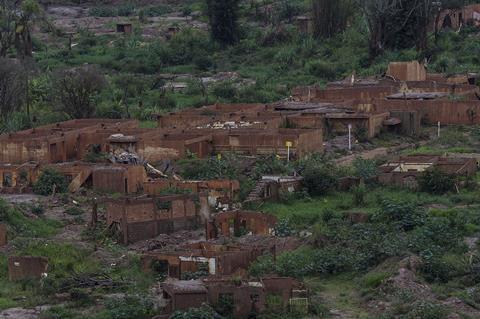Claimant lawyers in a colossal £5bn group litigation have made a final bid in the Court of Appeal to revive the struck-out case in England and Wales.
During a four-hour hearing yesterday, the claimants in Municipio De Mariana & Others V BHP Group PLC & Anor challenged the decision of Lord Justice Coulson not to allow permission to appeal last November’s strike-out judgment.
Mr Justice Turner had described the group litigation, involving an estimated 200,000 claimants affected by the collapse of the Fundao dam in Brazil, as ‘irredeemably unmanageable’ and having a damaging affect on the already scarce resources of the English courts.
Coulson LJ refused permission to appeal earlier this year, but lawyers for the claimants told the Court of Appeal yesterday that the judge had failed to articulate his reasons and failed to ‘grapple with the substance’ of the case.
For the claimants, Graham Dunning QC said: ‘It is not enough for the judge to make conclusionary remarks such as ‘this is obviously wrong or misconceived’… He was disparaging about it but didn’t engage with the argument and [didn’t] explain why it was wrong.’

Dunning said the original strike-out decision had been ‘draconian’ and wrongly based partly on how difficult the case might be to litigate. He suggested that Turner J ‘could and should have reconsidered what other case management techniques existed’.
The court, it was submitted, had also relied too heavily on an existing compensation scheme in Brazil for victims of the disaster which was deemed to have overlapped with the UK-based claims. Dunning said this scheme was voluntary and did not cover all the heads of loss that people wanted to claim for.
‘It is almost like saying that if you’ve had a car accident and your aunt sends you a cheque for £1,000 to get the car repaired, that you can’t get compensation from the other driver', he added.
Dunning denied that the claims were an abuse of the jurisdiction and said that resolution of any legal action in Brazil could take at least seven years.
Lawyers for the Anglo-Australian mining company said 20,000 claimants have already had cases resolved in Brazil and a judge in the country was handling matters through existing class action systems.
Charles Gibson QC said the court should resist permitting ‘pointless and wasteful litigation’ saying the action would be ‘utter chaos’ if allowed to proceed. He added that the claimants would have up to 30% of their damages deducted for legal costs in England and Wales, whereas in Brazil the claims were funded by legal aid.
Gibson said: ‘Mr Justice Turner considered the proceedings in this country would be irredeemably unmanageable and have a deleterious effect on claims in Brazil. There was no tangible benefit from bringing proceedings here – none at all.’
The case is the largest group claim in English legal history, worth an estimated £5bn, and was brought by PGMBM, a trading name of Excello Law Limited, on behalf of 202,600 individual, corporate and institutional claimants against two companies, incorporated in the UK and Australia.
Master of the rolls Sir Geoffrey Vos indicated near the start of the hearing that he would have allowed permission to appeal, but proceeded to hear submissions on whether Coulson LJ had erred. Judgment was reserved.





























6 Readers' comments